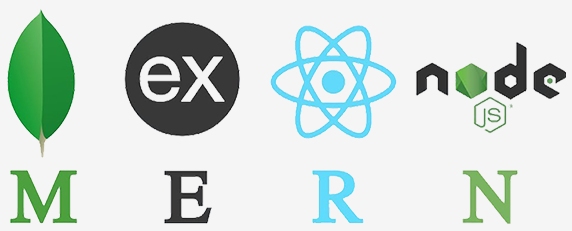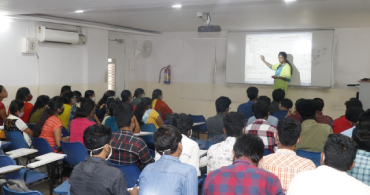

A comprehensive Full Stack Development Course ( MERN stack ) with theoretical & practical hands-on coding experience

Full stack development combines managing servers and databases and system engineering with both front-end and back development protocols to develop websites. We educate and equip students with course modules designed by experts with extensive experience in the industry.


I had the opportunity to pursue full stack web dev at Vector Hyderabad. The curriculum was structured in a way that steadily built confidence, especially through their regular, hands-on assignments/tests and implementing real world projects. One of the things I appreciated was how they kept pushing us toward real-world readiness instead of just theory.By the end of the full stack development program, I was able to land a role through their on campus placement support, which made the entire journey feel worthwhile.

I had a good learning experience at Vector India. The training was very helpful and easy to understand. Shekhar Sir explains concepts in a simple and clear way, which helped me improve my technical knowledge and confidence. The placement guidance was also good. I am thankful to Vector India and the faculty for their support. I recommend Vector India to students who want to start their IT career.

I joined Vector for the Python Full Stack Development course, which spanned six months and provided excellent exposure to a wide range of technologies. The teaching quality was outstanding, and the trainers explained every concept in a clear and practical manner. The course helped me build strong technical skills and boosted my confidence. Thanks to the training and guidance I received at Vector, I secured a campus placement at Mirafra Technologies with a package of 3.5 LPA. I am truly grateful for this learning experience and the support provided throughout the journey.

I'm Akarsh Chowdary enrolled at Vector India for the MERN Full Stack Development program, and the experience has been exceptional. Under the guidance of Shekar Reddy Sir and Sai Teja Sir, I gained strong technical expertise through structured teaching, real-time problem-solving, and practical lab sessions. Satish Sir’s communication classes greatly enhanced my soft skills and confidence. The dedicated lab hours and highly supportive lab coordinators ensured that doubts were clarified immediately, which strengthened my learning further. I’m also grateful to the placement team for their consistent support and timely guidance throughout the recruitment process. I’m pleased to share that I have secured a position at Mirafra Technologies with 3.5LPA, and I extend my heartfelt thanks to the entire Vector India team for shaping my career.

I completed my graduation in Sphoorthy Engineering College, which is affiliated to JNTUH. After that, I came to Hyderabad to pursue a Full Stack Development course at VECTOR INDIA. Honestly, joining Vector India was one of the best decisions I’ve made — the training was very practical, and the faculty explained every concept in a clear and simple way. With their continuous support and excellent placement assistance, I got placed in M2NXT Company with 3.6LPA. I’m really thankful to Vector India for helping me build a strong foundation and start my career in the IT field. I truly recommend VECTOR INDIA’s Full Stack course to anyone who wants to gain real-time knowledge and get placed in a good company. It’s the best place to learn, grow, and begin your professional journey. Thanks to VECTOR INDIA for being a big part of my success.

Hi everyone, I’m Raju Sivakoti, and I’m thrilled to share my learning journey with Vector India, where I was trained to become a Full Stack Developer. One of my friends recommended Vector India for its professional-level training, and I must say, the experience truly exceeded my expectations. The advanced teaching methods, hands-on projects, and expert trainers helped me build strong technical and professional foundations. A special thanks to Reddy Shekhar Reddy Sir for his valuable guidance and professionalism, and to Satish Sir for the soft skills sessions. The placement team was incredibly supportive and stood by us even during challenging times. I’m delighted to share that I’ve been placed at M2NXT Solutions Pvt Ltd as a Graduate Trainee Engineer – R&D Department, with an annual package of 3.6 LPA. I extend my heartfelt gratitude to the entire Vector India team — from the trainers and placement coordinators to the front desk and backend staff — for their constant support throughout my journey.

I am Jaswanth Kumar, and I completed my engineering from Abdul Kalam Institute of Technological Sciences, Kothagudem. I came to pursue the Full Stack Development course at Vector India to build a strong foundation in software development.The course was well-structured and very helpful. It provided in-depth knowledge of both frontend and backend technologies, which really helped me gain confidence and hands-on experience in Full Stack Development. I chose Vector India because of its reputation for quality training and its strong focus on practical learning. The trainers were supportive and explained concepts clearly, which made learning more effective. The placement assistance program was very supportive and guided me throughout the process—from resume building to mock interviews. It helped me prepare well for actual job interviews. Thanks to Vector India, I was able to get placed in Qodic Technosoft with 2.4LPA and it really helped shape the start of my career in the software industry. I would definitely recommend Vector India’s Full Stack Training Program to anyone looking to build a career in software development. It’s a great place to learn, grow, and get placed.

Hi everyone, I'm Venkatesh Madanwale. I'm excited to share my journey with Vector India, where I became a Full Stack Developer. My sister recommended Vector India for its professional-level training, and I was impressed by the advanced methods and expert trainers. The placement team was also very supportive, even during the recession. I had a great experience with Reddy Shekhar Reddy Sir, who provided valuable guidance and professionalism. Satish Sir's soft skills training was also enjoyable and insightful. Thanks to the trainers and support team, I got placed at Mirafra Technologies as a Software Engineer with the annual salary package of 3.5lpa. I'm grateful to the entire Vector India team, including the front desk, backend, teachers, and placement team.

I am extremely grateful to my institute for playing a crucial role in helping me secure a placement. The continuous support, guidance, and training provided by the faculty and the placement cell equipped me with the necessary skills and confidence to perform well during the recruitment process. From technical knowledge to soft skills, the institute ensured that I was prepared for every stage of the selection procedure. The mock interviews, workshops, and industry exposure offered by the institute were instrumental in shaping my career and helping me secure a job in Delta IoT Solutions with 3lpa. l achieved this milestone. I sincerely thank the entire team for their dedication and efforts toward my professional growth.

I am Iranna (V24HFS1I1), and I am thrilled to share one of the most memorable and proud moments of my journey. I want to express my heartfelt gratitude to my parents and everyone who encouraged me to join Vector India Pvt Ltd. It has truly been one of the best decisions of my life. A special thanks to the entire Vector Team for their unwavering support and guidance. The faculty's mentorship, hands-on training, interactive sessions, and motivation played a crucial role in boosting my confidence and preparing me to tackle challenges effectively. I am excited to embark on this new chapter with SD Wot with 2.4lpa, and I look forward to applying the skills and knowledge I have gained.

I'm Prasanna V23HFS1C3, by my friend's brother suggestion I have joined Vector India hyderabad in MERN Stack development. My aim is to upskill and get placed. Shekhar sir delivers the excellent knowledge of technologies, he is very friendly and clarifying the doubt by using live examples. The HR team is more reliable in conducting drives. Especially Sathyam sir and Mercy mam are very supportive and being available to students all the time and encourages to perform well. I have reached to final rounds in many companies like Astreya, GSPANN, Carrier, L&T etc. Even though I am good at technical but luck didn't favoured me many times but I didn't give up myself easily and I continue to try for next companies. Also I had lost high package companies, I didn't get demotivated. And finally I got placed in AMI company with 4Lpa. Thanks for the vector team for supporting and encouraging me in reaching my goals.

Hi, This is YaminiThangella, I would like to express my heartfelt thanks to Vector India Institute for helping me kickstart my career. The Full Stack course was well-structured, and the faculty was always supportive. Their commitment to providing excellent placement opportunities has led to my successful placement in a Good company. I highly recommend Vector India for anyone looking to advance their career in tech.

I completed my graduation in University college of engineering Kakatiya University, kothagudem. And I came to Hyderabad for taking full stack course and I really found the best institute VECTOR INDIA. And the course was very helpful to me. I really gained knowledge and got placed in NCR CORPORATION. My brother suggested me this institute. And this the best place to learn full stack. VECTOR INDIA Placement assistance helped me very much to place in NCR Company. Vector India really useful for setting my career.My career got started because of Vector only. For sure I'll recommend VECTOR full stack training for the students who want to learn and gain knowledge..... this institute will help you very much in getting a job and starting the career. Thanks to vectorindia.

I am Chepuri SaiMurali Krishna from Anurag Engineering College, Kodad, Suryapet. I am a CSE - B. Tech graduate of 2023 batch. The Full Stack Development course is really good at Vector India. I joined the institute on my cousin's suggestion, after checking reviews of previous students who got placed in many companies. Placements team at Vector India is really good, they supported me and moulded me. My goal to get placed in my dream company came true due to the support from the team of Vector India. I will definitely recommend this institute to my friends and relatives to fulfill their desire in getting placed in their dream company.

I'm Vishnu Vardhan Reddy, from a Computer Science and Engineering background, and I joined Vector India with a strong passion for Full Stack Development. My experience here has been very valuable. The institute gave me a solid foundation in both front-end and back-end development, covering essential technologies, frameworks, and database management. The faculty are very supportive and explain concepts clearly with real-time examples, while the lab sessions and workshops provided me with excellent hands-on experience. The placement support is also very good, offering opportunities in many core companies. I got placed in FISClouds with a salary of 2.4 LPA. Overall, Vector India has been a great step in shaping my career, and I would definitely recommend this institute for future batches who wish to build their career in the full stack domain.

Vector India Pvt. Ltd. is an excellent institute for anyone looking to build strong technical skills. I completed the MERN full stack development course here, and the training was comprehensive, covering both theoretical concepts and practical applications. The curriculum is well-structured and highly relevant to the current industry demands. The faculty is knowledgeable and supportive, ensuring that every student has a clear understanding of the subjects. They take a personalized approach to help students excel and gain confidence in their technical abilities. I am pleased to share that I secured a placement at Befach 4x Pvt. Ltd. with the help of the dedicated placement cell at Vector India. Their commitment to student success is evident in the continuous efforts they make to bring in top companies and provide ample opportunities for placements. I highly recommend Vector India Pvt. Ltd. to anyone looking to advance their career in the tech industry. Their training and placement support are truly top-notch!. Thanks to vectorindia.
Full stack development program can lead to a number of careers, including full stack developer, front-end engineer, full stack engineer and software engineer.
Full Stack Developers command high salaries across the world as their demand is soaring every year. A Full Stack Developer certification further increases the earning potential of such professionals. The salary of Full Stack Engineers ranges from minimum 5LPA to 40 LPA in India.
A Full Stack Developer is someone who works with the Back End — or server side — of the application as well as the Front End, or client side. Full Stack Developers have to have some skills in a wide variety of coding niches, from databases to graphic design and UI/UX management in order to do their job well.
A front-end developer develops the elements of a product that users interact with while a full stack developer can work cross-functionally on the both the front end and back end - the full “stack” of technology.
A full stack developer develops both the client-side elements and the back-end elements of a website while a back-end developer builds and maintains the technology that powers the back end of a website - the server, application, and database.
A full stack developer salary in India for a fresher is ₹375,000. A full-stack developer with early-level experience of 1-4 years earns a standard of ₹553,006 annually. An employee with mid-level experience of 5-9 years can secure about INR 12-14 lakhs.
Programming Languages: Full-stack developers should be competent in more than one programming language, such as Java, Python, PHP, Ruby, C++, etc.
Front End technologies: You should be familiar with front-end technologies such as HTML5, CSS3, JavaScript, etc.
Recent trends show that modern-day users do not want to know how a device works but they just want to utilize it with the shortest learning possible.
26, Nov 2021
The attrition rate of leading firms in India is now at an all-time high and companies are facing issues in executing large projects.
30, Oct 2021
It is quite evident that rapid increase in billions of IoT devices has already created a weak spot in the ecosystem due to lack of security.
3, Sept 2021
COVID-19 left us vulnerable to unprepared dangers that we have never encountered before. Due to its high transmissibility and the lack..
26, May 2021

Aspirants, who are willing to shape their career as an expert in Embedded System and Full Stack Development, can come to our institute and get the benefits of our training courses. We provide best in-class training courses that would reform your concept regarding the subject matter.